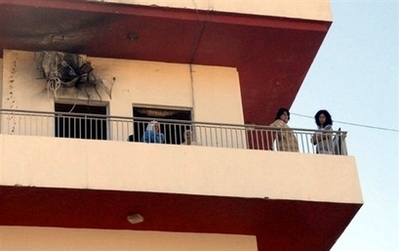 by Hassan Jarrah SAADNAYEL, Lebanon (AFP) - Three people were killed in armed clashes between supporters of Lebanon's rival factions in the Bekaa Valley overnight, the deadliest fighting since a political deal reached last month. Three people were killed and four wounded in the fighting," a security official told AFP. An AFP correspondent in the Bekaa area of eastern Lebanon said machine-gun fire, mortars and rocket-propelled grenades could be heard from midnight on Monday and continued sporadically until dawn.
by Hassan Jarrah SAADNAYEL, Lebanon (AFP) - Three people were killed in armed clashes between supporters of Lebanon's rival factions in the Bekaa Valley overnight, the deadliest fighting since a political deal reached last month. Three people were killed and four wounded in the fighting," a security official told AFP. An AFP correspondent in the Bekaa area of eastern Lebanon said machine-gun fire, mortars and rocket-propelled grenades could be heard from midnight on Monday and continued sporadically until dawn.
Two of the victims died in a drive-by shooting thought to have sparked the clashes in the villages of Saadnayel and Taalbaya in the largely Shiite area, medical and security officials said. "There was an exchange of fire in mixed (Sunni-Shiite) areas. We sent in a large force and the situation is now under control," an army official told AFP. The toll was the highest since rival factions reached a deal in Doha last month aimed at ending a tense 18-month political crisis which drove it to the brink of civil war.
Saadnayel and Taalbaya were also the scene of fighting earlier this month between supporters of the pro-government and anti-government. There was little traffic in the area on Tuesday and most stores remained shut, with residents fearing the fighting might resume, an AFP correspondent said. Meanwhile, Sleiman is to host a meeting next Tuesday of Lebanon's highest ranking clergymen from all sects in an effort to "encourage national reconciliation," an official from the presidential palace said.
Speaking to reporters after the meeting, Aoun compared the formation of the new government to piecing together a puzzle. "There is puzzle that needs to be pieced together ... a small piece is still missing."
Aoun said that the main problem regarding the formation of the new cabinet lies not in the names of the different ministers, but in how to distribute cabinet portfolios in a fair and balanced way.
"Allocating cabinet portfolios in a balanced manner is all that matters ... There is no veto on any candidate," Aoun said.
He said the solution to the ongoing dispute lies in adopting his recent initiative, referring to his proposal on how to allocate the four sovereign portfolios in the new cabinet.
"If the president is to get two sovereign portfolios [defense and interior], he should appoint a Muslim candidate for one post and a Christian candidate for the other," Aoun told Orange television on Saturday.
The MP argued that giving two key Christian ministers to the president would lead to "neutralizing the Christian role in the new cabinet."
When asked to specify the obstacles facing the formation of the new government, Aoun said that speaking about such obstacles would complicate matters rather than help solving them.
FPM lawmaker Ibrahim Kanaan told The Daily Star Monday that the meeting between Aoun and Sleiman was "positive."
Kanaan accused the parliamentary majority of trying to marginalize the "real representatives of Christians" in the new cabinet by pretending to side with the president.
"Despite our initial position on the presidency, we accepted that the post should go to a compromise candidate and therefore President Sleiman was elected, but we will not accept to apply the same criteria on the Christian ministers in the cabinet," Kanaan said.
"If the president is destined to tip two neutral candidates for his two sovereign portfolios, why should this be only at the expense of Christians?" he asked.
Kanaan said that the main purpose behind Aoun's meeting with Sleiman was to reach an understanding on how the Christian quota in the new cabinet should be treated.
However, well-informed sources told The Daily Star that Sleiman did not succeed in convincing Aoun to accept keeping caretaker Defense Minister Elias Murr in his post.
Earlier reports said the opposition was opposed to appointing Murr in any of the four sovereign portfolios and believed that accepting such appointment was equivalent to giving the parliamentary majority an additional minister in the cabinet.
Meanwhile, Prime Minister-designate Fouad Siniora's adviser, Mohammad Shattah, told The Daily Star that the meeting between Aoun and Sleiman was the most important development regarding the formation of Lebanon's new cabinet.
Shattah expressed hope that the meeting would contribute to speeding up the formation of the next government.
Also on Monday, Progressive Socialist Party leader MP Walid Jumblatt said that no party had the right to delay the formation of the new cabinet by sticking to certain demands.
In his weekly commentary for his party's daily Al-Anbaa, Jumblatt said continuing to create obstacles to the formation of the new government was preventing the country from advancing to a new political phase.
Jumblatt stressed that the Doha agreement, which ended an 18-month political crisis in the country, had drawn a clear road map for Lebanon. "We already agreed on the percentage that each party would get in the new government ... Any further delay of forming the new cabinet is completely unjustified."
Rival parties agreed in Doha that the majority would get 16 ministers in the new cabinet, leaving 11 for the opposition - ensuring it veto power - and three for the president.
Meanwhile, Lebanese Forces (LF) lawmaker Strida Geagea said after meeting Maronite Patriarch Nasrallah Butros Sfeir on Monday that none of the LF lawmakers will become ministers in the new government.